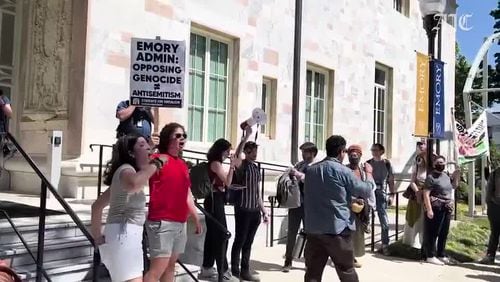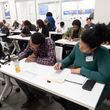ABOUT THE COLUMNIST
Gracie Bonds Staples is an award-winning journalist who has been writing for daily newspapers since 1979, when she graduated from the University of Southern Mississippi. She joined The Atlanta Journal-Constitution in 2000 after stints at the Fort Worth Star-Telegram, the Sacramento Bee, Raleigh Times and two Mississippi dailies. Staples was recently promoted to Senior Features Enterprise Writer. Look for her columns Thursdays and Saturdays in Living and alternating Sundays in Metro.
Three hours, 59 minutes, 11 seconds.
That's the amount of time it took Atlanta attorney Robert Threlkeld to finish Monday's Boston Marathon, far behind winner Lelisa Desisa.
Two years after the marathon bombing in 2013, some 30,000 runners, Threlkeld included, set out early Monday morning to compete in what’s considered one of the world’s most prestigious races. The marathon covers more than 26 miles of Boston’s hilly terrain, and this year’s runners toiled nearly every step of the way under rain and 20 mph headwinds.
It took Threlkeld a split second to decide to run again this year.
He hadn't planned on it, hadn't even trained, but when he got an email a few weeks ago asking him to support the Lingzi Foundation's efforts, there was only one answer. Yes.
He remembered the deadly finish-line explosions. Yes. He remembered the tense manhunt and unnerving lockdown. Yes. And police officers, those wounded and killed. Yes.
Who in their right mind could say no? This was the worst terrorist attack on American soil since Sept. 11, 2001.
Threlkeld and four of his friends were strung along Boylston Street, willing themselves to the finish line when bombs went off that fateful day in 2013.
“I thought a building had exploded,” he said.
One of his friends, Yvette Moore, came running up the street and right into him.
They stood still there for a while in their piece of peace. Safe.
When their legs finally allowed them to move, they walked around the corner to Copley Square.
“Since we couldn’t get into our hotel rooms, we sat there watching ambulances race by for hours,” he said. “It was stunning how many continued to come long after the bombings.”
Threlkeld started running with his high school sweetheart and wife, Dr. Anisa Threlkeld. He found it relaxing and challenging. Mostly, he liked the competition.
In January 1978, he ran his first marathon on the old Atlanta course beginning and ending at Westminster.
“The father of a close friend, Ben Gross, came out to run the last 3 miles with me on the course that day,” he said. “He was in his 50s and ran strongly through the Atlanta running scene in the 1970s and 1980s. I thought if I could emulate him, that would be a fine thing.”
Threlkeld continued to train and run in marathons as time allowed.
He returned to Boston last year on the first anniversary of the bombing and again on Monday. He had to because Lingzi Lu couldn’t.
Lu, a Boston University graduate student from China, was killed by the second bomb.
Though it was a last-minute decision, Threlkeld said he wanted to do something tangible to honor what happened that day.
In a Facebook post, the Atlanta attorney said, recent testimony at the trial of Dzhokhar Tsarnaev highlighted the events of the day for him and the shocking nature of Lu's passing.
Tsarnaev, 21, was found guilty earlier this month of the 2013 Boston Marathon bombing that killed three people and injured 264 others. The jury will now decide whether to sentence him to death.
“I’m thinking something positive must come from that day,” he wrote.
The Lingzi Foundation, founded in Lu’s memory to fund educational and humanitarian opportunities, he said, was a good way to make that happen.
And so on Monday, Threlkeld showed up, running the 26 miles from Hopkinton to Back Bay to raise money for the Lingzi Foundation, running through cold rain and wind, drawing strength all the way from knowing it was all for a good cause.
To honor Lingzi Lu.
The memory of that day, he said, still haunts him, and he thinks often of “the lives ended and fractured.”
“As a longtime runner, the idea of spectators being killed because they were there to watch the finish of the race is very troubling,” he said. “I hope they are watching today and every Boston Marathon. Long may they run!”
About the Author






